Exploring the Government's Role and Economic Issues in U.S. Healthcare
VerifiedAdded on 2023/06/08
|6
|1512
|494
Essay
AI Summary
This essay examines the multifaceted role of the U.S. government within the healthcare system, delving into economic issues and debates that shape its landscape. It begins by highlighting the significance of healthcare in the U.S. and the need for improvements, especially in addressing health disparities. The essay then analyzes the government's influence on healthcare financing, ownership, and organization, including the impact of the Affordable Care Act (ACA). It explores the ACA's goals of increasing insurance coverage, supporting innovative care methods, and expanding Medicaid, while also addressing criticisms and challenges related to its implementation. Furthermore, the essay examines economic issues, such as the high percentage of uninsured individuals and rising healthcare costs, and discusses the government's recent policies on short-term healthcare plans. It critiques these policies, emphasizing the importance of comprehensive coverage and equitable access to healthcare as a fundamental right, advocating for a strong partnership among government entities and the private sector to achieve supreme quality healthcare.
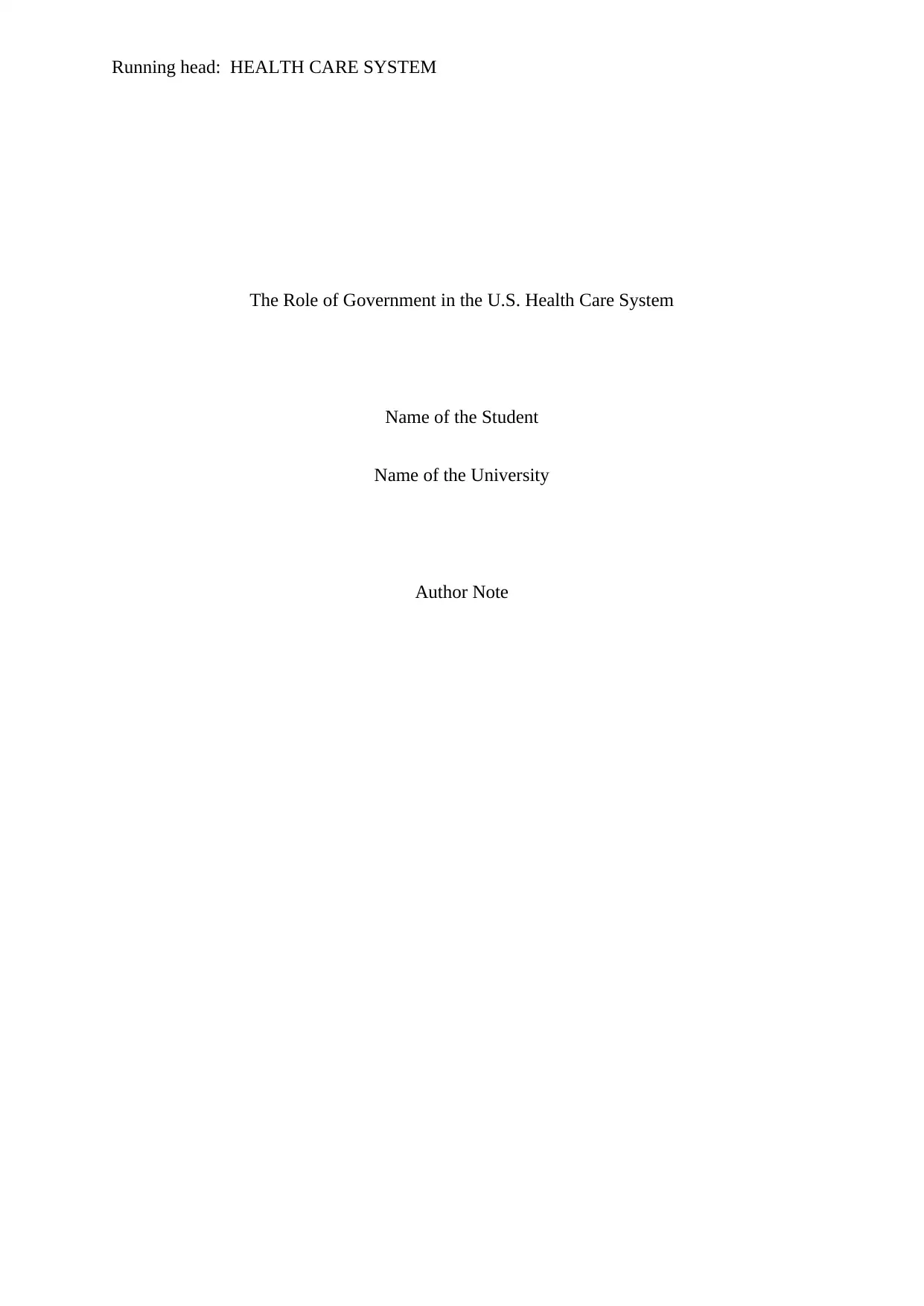
Running head: HEALTH CARE SYSTEM
The Role of Government in the U.S. Health Care System
Name of the Student
Name of the University
Author Note
The Role of Government in the U.S. Health Care System
Name of the Student
Name of the University
Author Note
Paraphrase This Document
Need a fresh take? Get an instant paraphrase of this document with our AI Paraphraser
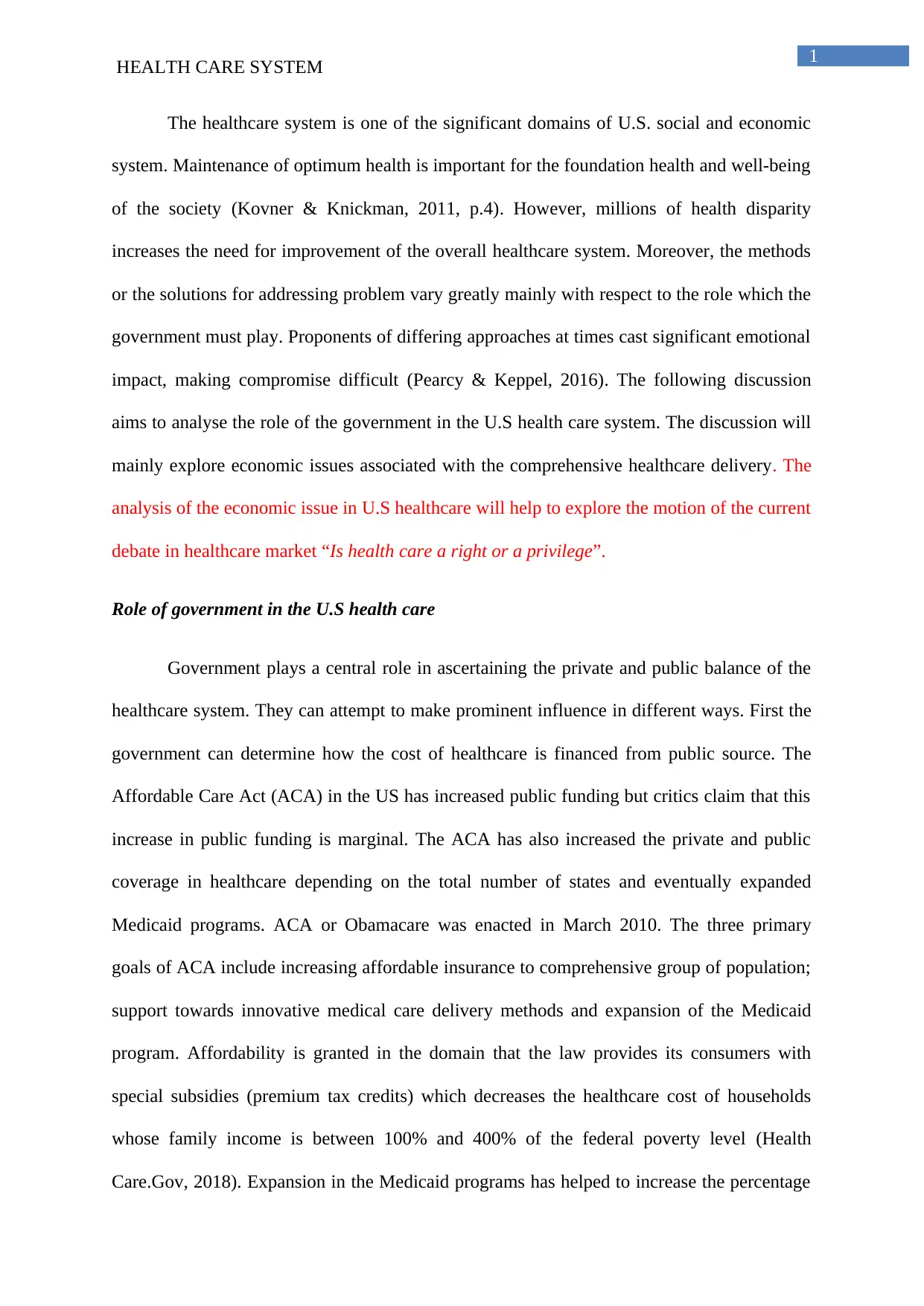
1
HEALTH CARE SYSTEM
The healthcare system is one of the significant domains of U.S. social and economic
system. Maintenance of optimum health is important for the foundation health and well-being
of the society (Kovner & Knickman, 2011, p.4). However, millions of health disparity
increases the need for improvement of the overall healthcare system. Moreover, the methods
or the solutions for addressing problem vary greatly mainly with respect to the role which the
government must play. Proponents of differing approaches at times cast significant emotional
impact, making compromise difficult (Pearcy & Keppel, 2016). The following discussion
aims to analyse the role of the government in the U.S health care system. The discussion will
mainly explore economic issues associated with the comprehensive healthcare delivery. The
analysis of the economic issue in U.S healthcare will help to explore the motion of the current
debate in healthcare market “Is health care a right or a privilege”.
Role of government in the U.S health care
Government plays a central role in ascertaining the private and public balance of the
healthcare system. They can attempt to make prominent influence in different ways. First the
government can determine how the cost of healthcare is financed from public source. The
Affordable Care Act (ACA) in the US has increased public funding but critics claim that this
increase in public funding is marginal. The ACA has also increased the private and public
coverage in healthcare depending on the total number of states and eventually expanded
Medicaid programs. ACA or Obamacare was enacted in March 2010. The three primary
goals of ACA include increasing affordable insurance to comprehensive group of population;
support towards innovative medical care delivery methods and expansion of the Medicaid
program. Affordability is granted in the domain that the law provides its consumers with
special subsidies (premium tax credits) which decreases the healthcare cost of households
whose family income is between 100% and 400% of the federal poverty level (Health
Care.Gov, 2018). Expansion in the Medicaid programs has helped to increase the percentage
HEALTH CARE SYSTEM
The healthcare system is one of the significant domains of U.S. social and economic
system. Maintenance of optimum health is important for the foundation health and well-being
of the society (Kovner & Knickman, 2011, p.4). However, millions of health disparity
increases the need for improvement of the overall healthcare system. Moreover, the methods
or the solutions for addressing problem vary greatly mainly with respect to the role which the
government must play. Proponents of differing approaches at times cast significant emotional
impact, making compromise difficult (Pearcy & Keppel, 2016). The following discussion
aims to analyse the role of the government in the U.S health care system. The discussion will
mainly explore economic issues associated with the comprehensive healthcare delivery. The
analysis of the economic issue in U.S healthcare will help to explore the motion of the current
debate in healthcare market “Is health care a right or a privilege”.
Role of government in the U.S health care
Government plays a central role in ascertaining the private and public balance of the
healthcare system. They can attempt to make prominent influence in different ways. First the
government can determine how the cost of healthcare is financed from public source. The
Affordable Care Act (ACA) in the US has increased public funding but critics claim that this
increase in public funding is marginal. The ACA has also increased the private and public
coverage in healthcare depending on the total number of states and eventually expanded
Medicaid programs. ACA or Obamacare was enacted in March 2010. The three primary
goals of ACA include increasing affordable insurance to comprehensive group of population;
support towards innovative medical care delivery methods and expansion of the Medicaid
program. Affordability is granted in the domain that the law provides its consumers with
special subsidies (premium tax credits) which decreases the healthcare cost of households
whose family income is between 100% and 400% of the federal poverty level (Health
Care.Gov, 2018). Expansion in the Medicaid programs has helped to increase the percentage
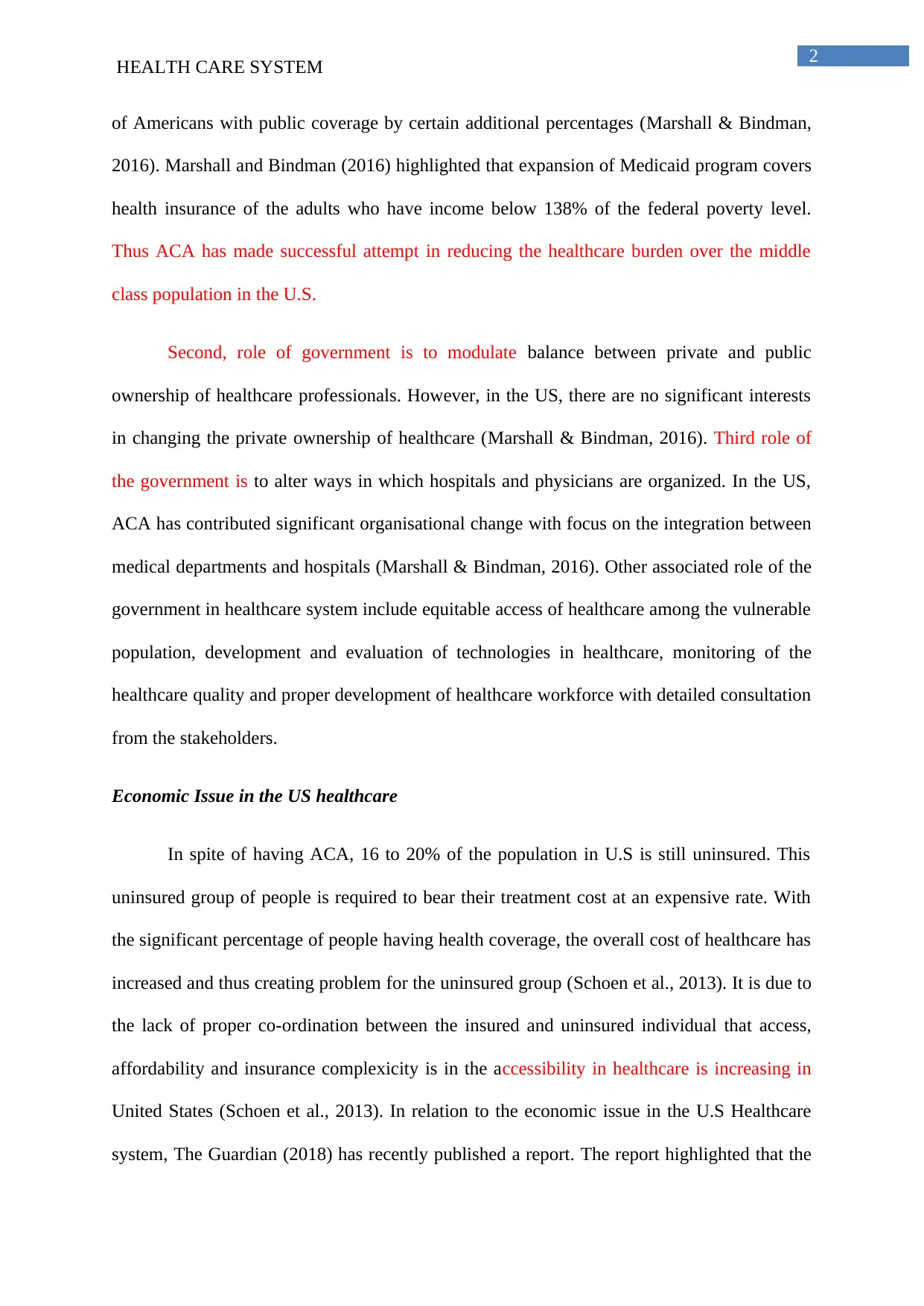
2
HEALTH CARE SYSTEM
of Americans with public coverage by certain additional percentages (Marshall & Bindman,
2016). Marshall and Bindman (2016) highlighted that expansion of Medicaid program covers
health insurance of the adults who have income below 138% of the federal poverty level.
Thus ACA has made successful attempt in reducing the healthcare burden over the middle
class population in the U.S.
Second, role of government is to modulate balance between private and public
ownership of healthcare professionals. However, in the US, there are no significant interests
in changing the private ownership of healthcare (Marshall & Bindman, 2016). Third role of
the government is to alter ways in which hospitals and physicians are organized. In the US,
ACA has contributed significant organisational change with focus on the integration between
medical departments and hospitals (Marshall & Bindman, 2016). Other associated role of the
government in healthcare system include equitable access of healthcare among the vulnerable
population, development and evaluation of technologies in healthcare, monitoring of the
healthcare quality and proper development of healthcare workforce with detailed consultation
from the stakeholders.
Economic Issue in the US healthcare
In spite of having ACA, 16 to 20% of the population in U.S is still uninsured. This
uninsured group of people is required to bear their treatment cost at an expensive rate. With
the significant percentage of people having health coverage, the overall cost of healthcare has
increased and thus creating problem for the uninsured group (Schoen et al., 2013). It is due to
the lack of proper co-ordination between the insured and uninsured individual that access,
affordability and insurance complexicity is in the accessibility in healthcare is increasing in
United States (Schoen et al., 2013). In relation to the economic issue in the U.S Healthcare
system, The Guardian (2018) has recently published a report. The report highlighted that the
HEALTH CARE SYSTEM
of Americans with public coverage by certain additional percentages (Marshall & Bindman,
2016). Marshall and Bindman (2016) highlighted that expansion of Medicaid program covers
health insurance of the adults who have income below 138% of the federal poverty level.
Thus ACA has made successful attempt in reducing the healthcare burden over the middle
class population in the U.S.
Second, role of government is to modulate balance between private and public
ownership of healthcare professionals. However, in the US, there are no significant interests
in changing the private ownership of healthcare (Marshall & Bindman, 2016). Third role of
the government is to alter ways in which hospitals and physicians are organized. In the US,
ACA has contributed significant organisational change with focus on the integration between
medical departments and hospitals (Marshall & Bindman, 2016). Other associated role of the
government in healthcare system include equitable access of healthcare among the vulnerable
population, development and evaluation of technologies in healthcare, monitoring of the
healthcare quality and proper development of healthcare workforce with detailed consultation
from the stakeholders.
Economic Issue in the US healthcare
In spite of having ACA, 16 to 20% of the population in U.S is still uninsured. This
uninsured group of people is required to bear their treatment cost at an expensive rate. With
the significant percentage of people having health coverage, the overall cost of healthcare has
increased and thus creating problem for the uninsured group (Schoen et al., 2013). It is due to
the lack of proper co-ordination between the insured and uninsured individual that access,
affordability and insurance complexicity is in the accessibility in healthcare is increasing in
United States (Schoen et al., 2013). In relation to the economic issue in the U.S Healthcare
system, The Guardian (2018) has recently published a report. The report highlighted that the
⊘ This is a preview!⊘
Do you want full access?
Subscribe today to unlock all pages.

Trusted by 1+ million students worldwide
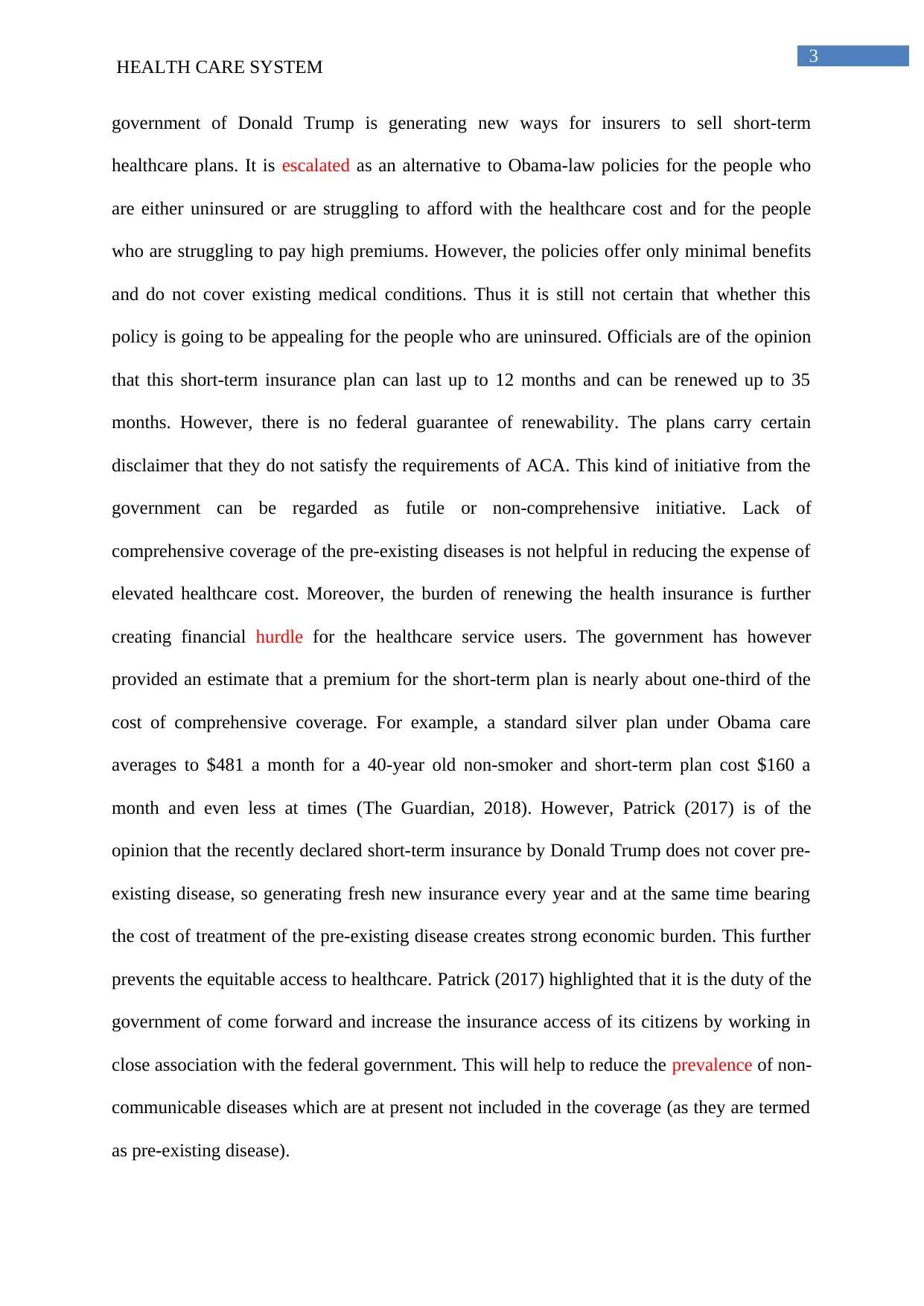
3
HEALTH CARE SYSTEM
government of Donald Trump is generating new ways for insurers to sell short-term
healthcare plans. It is escalated as an alternative to Obama-law policies for the people who
are either uninsured or are struggling to afford with the healthcare cost and for the people
who are struggling to pay high premiums. However, the policies offer only minimal benefits
and do not cover existing medical conditions. Thus it is still not certain that whether this
policy is going to be appealing for the people who are uninsured. Officials are of the opinion
that this short-term insurance plan can last up to 12 months and can be renewed up to 35
months. However, there is no federal guarantee of renewability. The plans carry certain
disclaimer that they do not satisfy the requirements of ACA. This kind of initiative from the
government can be regarded as futile or non-comprehensive initiative. Lack of
comprehensive coverage of the pre-existing diseases is not helpful in reducing the expense of
elevated healthcare cost. Moreover, the burden of renewing the health insurance is further
creating financial hurdle for the healthcare service users. The government has however
provided an estimate that a premium for the short-term plan is nearly about one-third of the
cost of comprehensive coverage. For example, a standard silver plan under Obama care
averages to $481 a month for a 40-year old non-smoker and short-term plan cost $160 a
month and even less at times (The Guardian, 2018). However, Patrick (2017) is of the
opinion that the recently declared short-term insurance by Donald Trump does not cover pre-
existing disease, so generating fresh new insurance every year and at the same time bearing
the cost of treatment of the pre-existing disease creates strong economic burden. This further
prevents the equitable access to healthcare. Patrick (2017) highlighted that it is the duty of the
government of come forward and increase the insurance access of its citizens by working in
close association with the federal government. This will help to reduce the prevalence of non-
communicable diseases which are at present not included in the coverage (as they are termed
as pre-existing disease).
HEALTH CARE SYSTEM
government of Donald Trump is generating new ways for insurers to sell short-term
healthcare plans. It is escalated as an alternative to Obama-law policies for the people who
are either uninsured or are struggling to afford with the healthcare cost and for the people
who are struggling to pay high premiums. However, the policies offer only minimal benefits
and do not cover existing medical conditions. Thus it is still not certain that whether this
policy is going to be appealing for the people who are uninsured. Officials are of the opinion
that this short-term insurance plan can last up to 12 months and can be renewed up to 35
months. However, there is no federal guarantee of renewability. The plans carry certain
disclaimer that they do not satisfy the requirements of ACA. This kind of initiative from the
government can be regarded as futile or non-comprehensive initiative. Lack of
comprehensive coverage of the pre-existing diseases is not helpful in reducing the expense of
elevated healthcare cost. Moreover, the burden of renewing the health insurance is further
creating financial hurdle for the healthcare service users. The government has however
provided an estimate that a premium for the short-term plan is nearly about one-third of the
cost of comprehensive coverage. For example, a standard silver plan under Obama care
averages to $481 a month for a 40-year old non-smoker and short-term plan cost $160 a
month and even less at times (The Guardian, 2018). However, Patrick (2017) is of the
opinion that the recently declared short-term insurance by Donald Trump does not cover pre-
existing disease, so generating fresh new insurance every year and at the same time bearing
the cost of treatment of the pre-existing disease creates strong economic burden. This further
prevents the equitable access to healthcare. Patrick (2017) highlighted that it is the duty of the
government of come forward and increase the insurance access of its citizens by working in
close association with the federal government. This will help to reduce the prevalence of non-
communicable diseases which are at present not included in the coverage (as they are termed
as pre-existing disease).
Paraphrase This Document
Need a fresh take? Get an instant paraphrase of this document with our AI Paraphraser
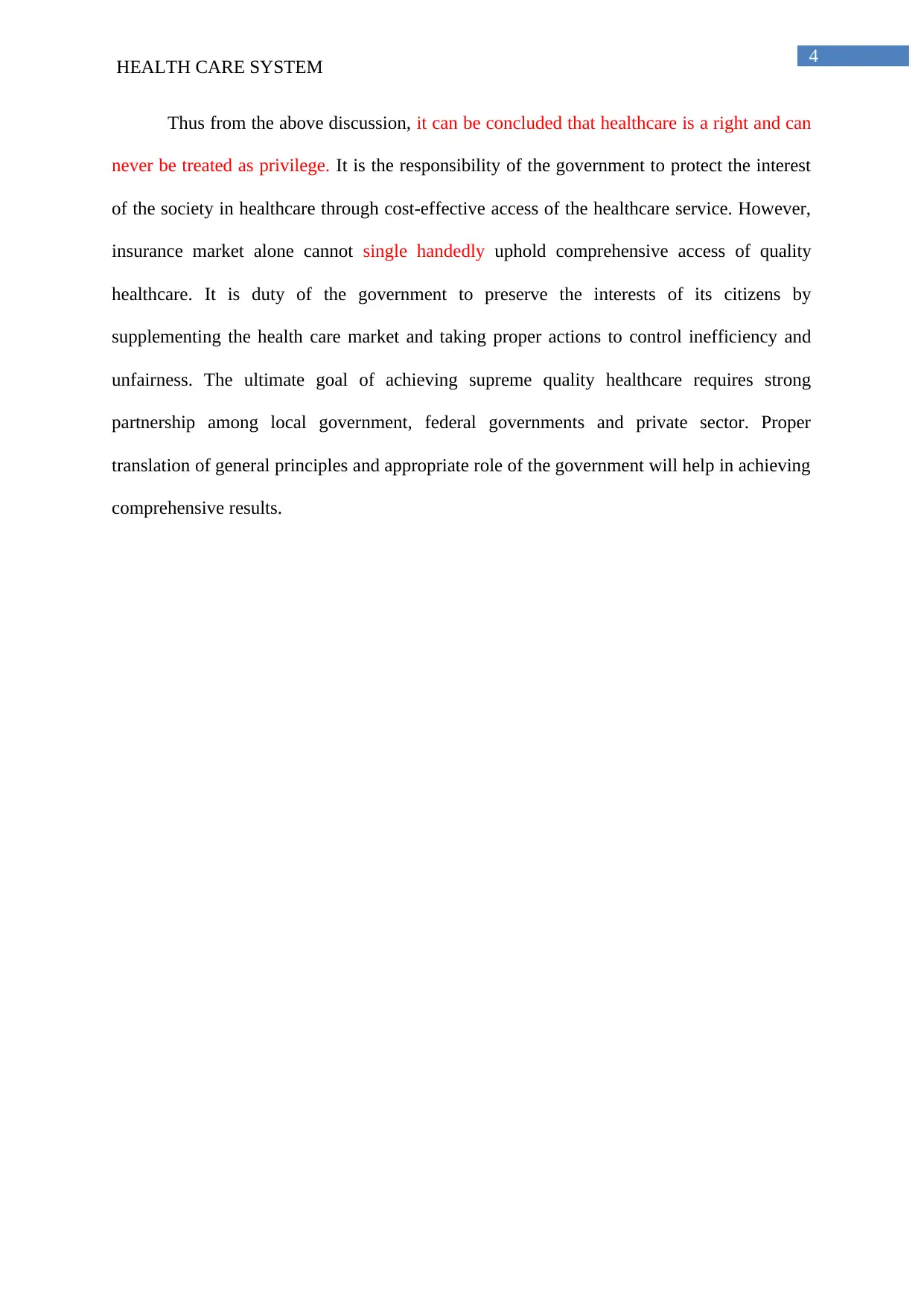
4
HEALTH CARE SYSTEM
Thus from the above discussion, it can be concluded that healthcare is a right and can
never be treated as privilege. It is the responsibility of the government to protect the interest
of the society in healthcare through cost-effective access of the healthcare service. However,
insurance market alone cannot single handedly uphold comprehensive access of quality
healthcare. It is duty of the government to preserve the interests of its citizens by
supplementing the health care market and taking proper actions to control inefficiency and
unfairness. The ultimate goal of achieving supreme quality healthcare requires strong
partnership among local government, federal governments and private sector. Proper
translation of general principles and appropriate role of the government will help in achieving
comprehensive results.
HEALTH CARE SYSTEM
Thus from the above discussion, it can be concluded that healthcare is a right and can
never be treated as privilege. It is the responsibility of the government to protect the interest
of the society in healthcare through cost-effective access of the healthcare service. However,
insurance market alone cannot single handedly uphold comprehensive access of quality
healthcare. It is duty of the government to preserve the interests of its citizens by
supplementing the health care market and taking proper actions to control inefficiency and
unfairness. The ultimate goal of achieving supreme quality healthcare requires strong
partnership among local government, federal governments and private sector. Proper
translation of general principles and appropriate role of the government will help in achieving
comprehensive results.
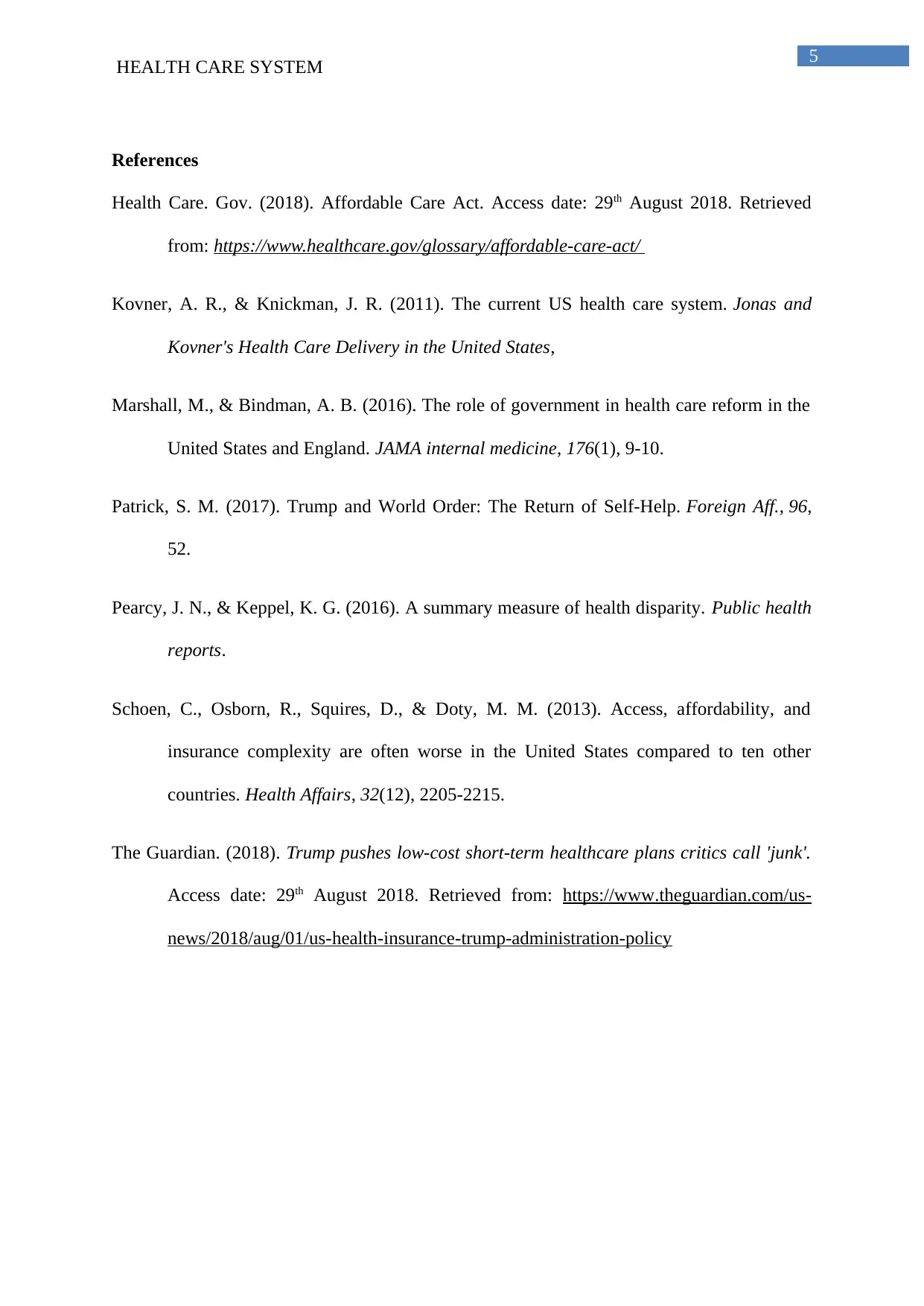
5
HEALTH CARE SYSTEM
References
Health Care. Gov. (2018). Affordable Care Act. Access date: 29th August 2018. Retrieved
from: https://www.healthcare.gov/glossary/affordable-care-act/
Kovner, A. R., & Knickman, J. R. (2011). The current US health care system. Jonas and
Kovner's Health Care Delivery in the United States,
Marshall, M., & Bindman, A. B. (2016). The role of government in health care reform in the
United States and England. JAMA internal medicine, 176(1), 9-10.
Patrick, S. M. (2017). Trump and World Order: The Return of Self-Help. Foreign Aff., 96,
52.
Pearcy, J. N., & Keppel, K. G. (2016). A summary measure of health disparity. Public health
reports.
Schoen, C., Osborn, R., Squires, D., & Doty, M. M. (2013). Access, affordability, and
insurance complexity are often worse in the United States compared to ten other
countries. Health Affairs, 32(12), 2205-2215.
The Guardian. (2018). Trump pushes low-cost short-term healthcare plans critics call 'junk'.
Access date: 29th August 2018. Retrieved from: https://www.theguardian.com/us-
news/2018/aug/01/us-health-insurance-trump-administration-policy
HEALTH CARE SYSTEM
References
Health Care. Gov. (2018). Affordable Care Act. Access date: 29th August 2018. Retrieved
from: https://www.healthcare.gov/glossary/affordable-care-act/
Kovner, A. R., & Knickman, J. R. (2011). The current US health care system. Jonas and
Kovner's Health Care Delivery in the United States,
Marshall, M., & Bindman, A. B. (2016). The role of government in health care reform in the
United States and England. JAMA internal medicine, 176(1), 9-10.
Patrick, S. M. (2017). Trump and World Order: The Return of Self-Help. Foreign Aff., 96,
52.
Pearcy, J. N., & Keppel, K. G. (2016). A summary measure of health disparity. Public health
reports.
Schoen, C., Osborn, R., Squires, D., & Doty, M. M. (2013). Access, affordability, and
insurance complexity are often worse in the United States compared to ten other
countries. Health Affairs, 32(12), 2205-2215.
The Guardian. (2018). Trump pushes low-cost short-term healthcare plans critics call 'junk'.
Access date: 29th August 2018. Retrieved from: https://www.theguardian.com/us-
news/2018/aug/01/us-health-insurance-trump-administration-policy
⊘ This is a preview!⊘
Do you want full access?
Subscribe today to unlock all pages.

Trusted by 1+ million students worldwide
1 out of 6
Related Documents
Your All-in-One AI-Powered Toolkit for Academic Success.
+13062052269
info@desklib.com
Available 24*7 on WhatsApp / Email
![[object Object]](/_next/static/media/star-bottom.7253800d.svg)
Unlock your academic potential
Copyright © 2020–2026 A2Z Services. All Rights Reserved. Developed and managed by ZUCOL.





